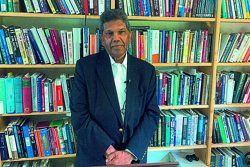 It is difficult to avoid the shocking events of Wednesday last in the United States of America. But whatever the politics of those of us who are not US citizens, however limited our understanding of US history and politics, and whatever criticisms we may have of American domestic and foreign policies, it is a matter of vital importance for the world that American democracy, the world’s oldest, remains strong. American policy has not always benefitted all Americans or the countries which it has sought to influence, by peaceful or violent means. But, as in Guyana over the past twenty-five years, it was the existence of American democracy that enabled democracy in Guyana, the subversion of which the US initially influenced in the past, to be restored in 1992 and to be sustained in 2020. The survival of democracy in the US is vital for its survival in Guyana. And its survival in Guyana is a pre-requisite for the eventual success of attaining inclusivity in governance.
It is difficult to avoid the shocking events of Wednesday last in the United States of America. But whatever the politics of those of us who are not US citizens, however limited our understanding of US history and politics, and whatever criticisms we may have of American domestic and foreign policies, it is a matter of vital importance for the world that American democracy, the world’s oldest, remains strong. American policy has not always benefitted all Americans or the countries which it has sought to influence, by peaceful or violent means. But, as in Guyana over the past twenty-five years, it was the existence of American democracy that enabled democracy in Guyana, the subversion of which the US initially influenced in the past, to be restored in 1992 and to be sustained in 2020. The survival of democracy in the US is vital for its survival in Guyana. And its survival in Guyana is a pre-requisite for the eventual success of attaining inclusivity in governance.
President-elect Joe Biden referred to the storming of the US Capitol by riotous crowds “one of the darkest days in the history of our nation.” He described the crowds as “a riotous mob,” insurrectionists,” and “domestic terrorists” and placed the blame squarely on the words and deeds of President Trump. “The past four years, we’ve had a President whose made his contempt for our democracy, our Constitution and the rule of law clear in everything he’s done,” Biden said. After it became clear that the 2,000 Capitol police had made no plan to deal with the rioters, refused help from other police agencies that were offered, virtually allowed the mobs free access to the building in certain parts, arrested few, Biden said that if the protesters had belonged to Black Lives Matter, they would have been treated “very differently.” Several persons, including one female protester and one police officer, were killed during the protests. The leadership of the Capitol police resigned.
Criticisms were widespread but of varying depths, ranging far and wide:
“It is time for the world to see through the American claims of exceptionalism” – Patrick Gathara.
“Today is a day of reckoning for all Americans who believe their democracy is ‘just too strong to fail’” – Andrea Mammone.
“What Trump has done in the last four years is expose to the world the dysfunctionality of the American political system and culture. He has exposed the myth of American political exceptionalism” – David Hinds.
“President Trump is the one most accountable” – G.H.K. Lall.
“The day Trump finally lost it” – Marwan Bishara.
“One shouldn’t use the term ‘fascist’ lightly…Donald Trump, however, is indeed a fascist – an authoritarian willing to use violence to achieve his racial nationalist goals…And if history teaches us one lesson about dealing with fascists, it is the futility of appeasement” – Paul Krugman.
Twitter has banned Trump permanently because of his use of the platform to encourage violence, which he did at a rally a few hours before the riot at the Capital. Congress is making preparations to once again impeach him, but time is limited.
Mostly, but not in every case, analysis was limited to the Trump era and its negative consequences on race relations, encouragement of white supremacy, suppression of free speech and the right to protest, and encouragement of violence. Some writers understood that Trump exploited a vein of dissatisfaction that had been welling up in rural America for a long time and which successive Presidents have failed to resolve. An enormous amount of scholarship exists to demonstrate that from the 1970s onwards the income of middle-class Americans has remained static and the value of that income today is the same as it was in the 1970s. At the same time the income of the top one percent has skyrocketed and Trump has substantially reduced their tax liability. American politicians, with notable exceptions, are aware that this widening gap is fueling the rise of Trump style ‘fascism’ but do little to arrest it.
Some commentators go back even further and emphasise the one dominant strain in US politics, which is race, racial suppression by white supremacists and the influence of race on US political developments. It took a civil war to abolish slavery. Reconstruction was derailed, giving rise to the Jim Crow era. A nationwide movement of African Americans and their allies in the Civil Rights movement was necessary to end Jim Crow and establish civil and voting rights, now under attack. The fascist, white supremacist movement today, led by Trump, is a reaction to the loss of economic power of the white middle class, the widening struggle of African Americans against the largescale imprisonment of and police violence against African Americans led by Black Lives Matter and the growing numbers of Black and Brown people in the US, likely to become the majority in coming decades.
Two differing approaches have emerged from the same side of the US establishment, albeit one more progressive than the other – Joe Biden and Paul Krugman. Biden’s solution is engagement with Republicans. Krugman’s is defeat of republican ideology and of fascism. The oppressed do not have to be told that no one will bring them gifts. They know that only organizing and struggle will extract results.
This column is reproduced, with permission, fromRalph Ramkarran’s blog: www.conversationtree.gy









